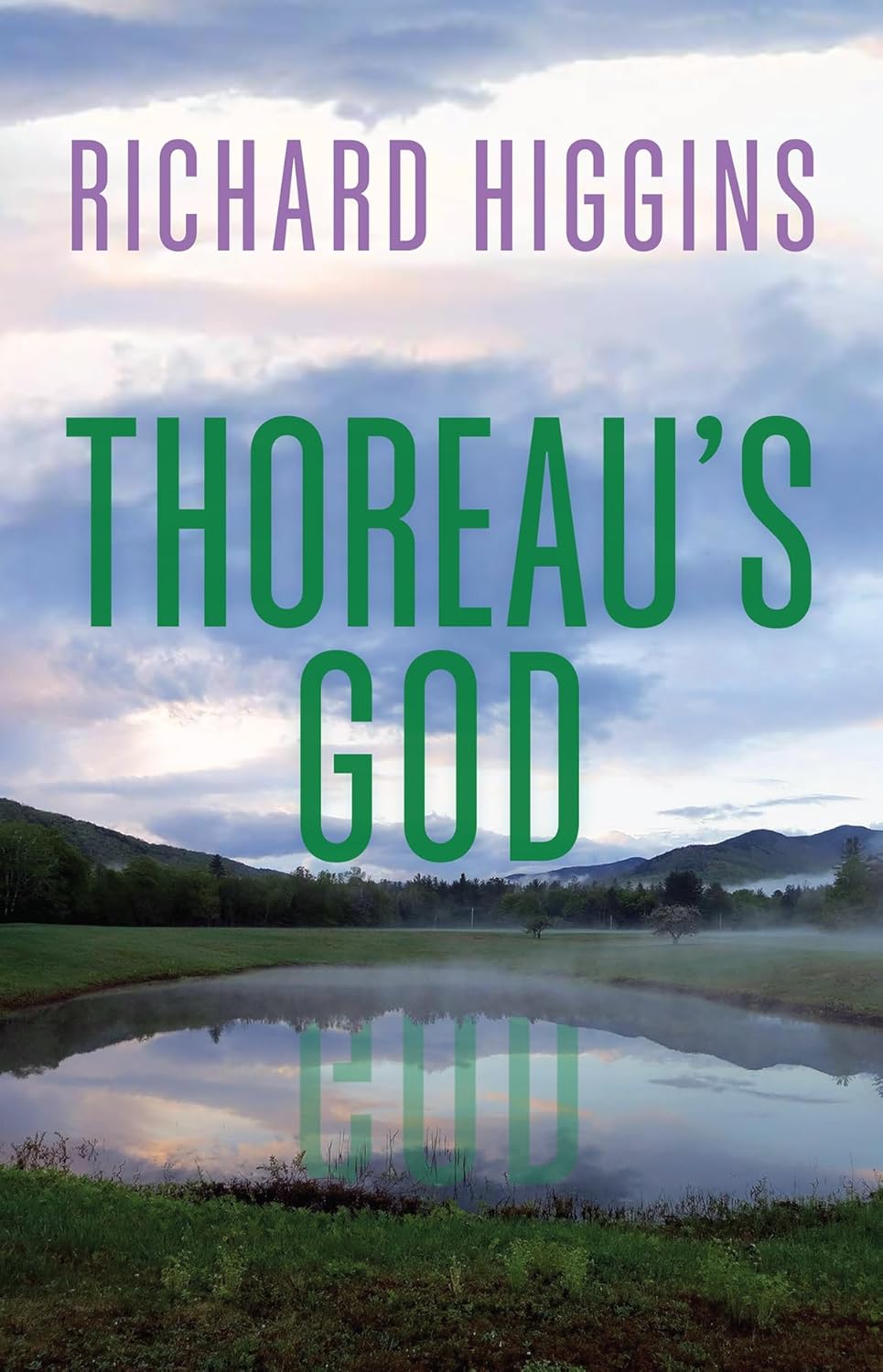Thoreau’s God
- By Richard Higgins
- University of Chicago Press
- 224 pp.
- Reviewed by Christopher Lancette
- November 18, 2024
This one’s a heavy lift, but it just might help you connect with the divine.

“Our religion is where our love is.”
– Henry David Thoreau
You could be forgiven for wanting to skip yet another book about Henry David Thoreau, a literary and personal hero to me and millions of others, but a man whose writing can feel like the intellectual equivalent of childhood vegetables: You have to be forced to eat it. Every time I read something by or about him, I flip from wanting to run outside and shout Thoreau’s name on high because I so revere the man, to bashing my head against a tree because he can be so agonizing to decipher.
I’d be lying if I didn’t report that Thoreau’s God, by former Boston Globe staff writer Richard Higgins, sent me both to the mountaintop and to the tree. I probably spent as much time in its pages wondering why I continue to torture myself with Thoreau as I did reveling in the life lessons he bestows. This is what happens when you combine such massive subjects as the great inscrutable being himself…and God.
But the book is worth the labor required to get through it. Thoreau’s God is an invitation to join hands with the transcendentalist, explore nature, find out who or what God is to you, and develop (or refine) your personal spiritual practices to honor that divine mystery.
For funsies, Higgins and Thoreau also help you assess what you consider to be religion.
“For Thoreau, religion is a matter of who we are and how we live — in particular, whether we act justly toward all life, human and nonhuman,” Higgins writes in his preface. “And what matters more than any one faith is an attitude of faithfulness.” Here and elsewhere, the author does a better job than Thoreau at explaining what Thoreau means.
Thoreau at his spiritual best is a comprehensible, soul-lifting poet worthy of those prerequisite head-bashing bandages, and Higgins wisely quotes classic lines from his most notable works, including this breathtaking snippet from Thoreau’s essay “Walking”:
“I believe in the forest, and in the meadow, and in the night in which the corn grows.”
Perhaps the most compelling argument Higgins makes is that Thoreau didn’t see Nature (with a capital N) only as God — but also as a product of God. “Blessed are they who never read a newspaper,” Thoreau wrote in a letter, “for they shall see Nature, and through her, God.”
The logical next step for building (or strengthening) a relationship with a great spirit is figuring out how to commune with it. Thoreau was not a man who believed worshiping inside buildings was the best way to connect with God. Higgins sums up his subject’s habits this way:
“Thoreau strove to experience the sacred through spiritual practices, such as walking, meditation, close observation of nature, reading, keeping a journal, prayer, hoeing beans, and purifying his body through diet and bathing.”
The author adds that Thoreau viewed “contemplation, moral introspection, and reading the natural world as a second scripture.”
I submit that spiritual practices can be anything you want — and that you don’t need to live alone in a cabin in the woods to suck the marrow out of life. Instead, take baby steps. Go outside to your nearest tree every morning, inhale deeply, and absorb the beauty all around you. You can figure out the rest from there. (Need a little bit of hand-holding to get you going? I suggest an online course through the Center for Spirituality in Nature called the Spiritual Wisdom of Trees: Insights from our Elders.)
For Higgins, Thoreau was about the ever-deliberate task of seeking God. “My profession is to be always on the alert to find God in nature, to know his lurking places,” he quotes. “To attend all the oratories, the operas in nature.”
Higgins’ book pairs nicely with another work published this year by Barry M. Andrews, The Gospel According to This Moment: The Spiritual Message of Henry David Thoreau (not to mention David Gessner’s Quiet Desperation, Savage Delight, one of my favorite recent additions to Thoreauviana). Andrews zeroes in on a theme Higgins also covers — Thoreau’s belief in the virtue of living with purpose in the present moment. Neither Andrews nor Higgins, however, makes any claims that Thoreau set out to blaze a trail for us.
“Although the creativity of Thoreau’s religious thought and its centrality to his life’s work is increasingly being recognized by scholars, he did not leave a clearly marked or easy-to-follow spiritual path for others,” Higgins writes.
Thoreau’s God and Thoreau’s work, though, deliver an open invitation for everyone to start walking.
Christopher Lancette is a Silver Spring, Maryland, freelance writer focusing on nature and the environment. Read more of his work and find his social-media links here.

